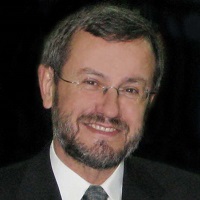7. Motion estimation
8. Introduction to Machine Learning
LECTURE DESCRIPTION
LECTURE 7: Motion estimation
Wednesday 20th May 2020, 17:00-17:45 EEST
Summary: Motion estimation principals will be analyzed. Initiating form 2D and 3D motion models, displacement estimation as well as quality metrics for motion estimation will subsequently be detailed. One of the basic motion estimation techniques, namely block matching, will also be presented, along with three alternative, faster methods. A good overview of deep neural notion estimation will be presented. Phase correlation will be described, next followed by optical flow equation methods. Finally, a brief introduction to object detection and tracking will conclude the lecture.


Sample lecture material
– sample slides DOWNLOAD
Related Literature:
- Pitas, “Digital Video and Television ” , Createspace/Amazon, 2013.
- Pitas, “Digital video processing and analysis ” , China Machine Press, 2017 (in Chinese).
- Wang, J. Ostermann,YQ. Zhang. Video processing and communications, Prentice hall, 2002.
- Pitas, “Computer vision”, Createspace/Amazon, in press.
Lecture 8: Introduction to Machine Learning
Wednesday 20th May 2020, 17:45-18:30 EEST
Summary: This lecture will cover the basic concepts of Machine Learning. Supervised, self-supervised, unsupervised, semi-supervised learning. Multi-task Machine Learning. Classification, regression. Object detection, Object tracking. Clustering. Dimensionality reduction, data retrieval. Artificial Neural Networks. Adversarial Machine Learning. Generative Machine Learning. Temporal Machine learning (Recurrent Neural Networks). Continual Learning (few-shot learning, online learning). Reinforcement Learning. Adaptive learning (Knowledge Distillation, Domain adaptation, Transfer learning, Activation Pattern Analysis, Federated learning/Collaborative learning, Ensemble learning). Precise mathematical definitions of ML tasks will be presented.


Sample lecture material
– sample slides DOWNLOAD
Related Literature
- C.M. Bishop, Pattern recognition and machine learning, Springer, 2006.
- Goodfellow, Y. Bengio, A. Courville, Deep learning, MIT press, 2016
- Theodoridis, K. Koutroumbas, Pattern Recognition, Elsevier, 2011.
LECTURER

Prof. Ioannis Pitas (IEEE fellow, IEEE Distinguished Lecturer, EURASIP fellow) received the Diploma and PhD degree in Electrical Engineering, both from the Aristotle University of Thessaloniki, Greece. Since 1994, he has been a Professor at the Department of Informatics of the same University.
His current interests are in the areas of machine learning, computer vision, intelligent digital media, human centered interfaces, affective computing, 3D imaging and biomedical imaging. He has published over 860 papers, contributed in 44 books in his areas of interest and edited or (co-)authored another 11 books. He has also been member of the program committee of many scientific conferences and workshops. In the past he served as Associate Editor or co-Editor of 9 international journals and General or Technical Chair of 4 international conferences. He participated in 69 R&D projects, primarily funded by the European Union and is/was principal investigator/researcher in 41 such projects.
He has 31000+ citations to his work and h-index 83+ (Google Scholar)
Prof. Pitas lead the big European H2020 R&D project MULTIDRONE: https://multidrone.eu/ and is principal investigator (AUTH) in H2020 projects Aerial Core and AI4Media. He is chair of the Autonomous Systems initiative https://ieeeasi.signalprocessingsociety.org/.
Lecturing record of Prof. I. Pitas: He was Visiting/Adjunct/Honorary Professor/Researcher and lectured at several Universities: University of Toronto (Canada), University of British Columbia (Canada), EPFL (Switzerland), Chinese Academy of Sciences (China), University of Bristol (UK), Tampere University of Technology (Finland), Yonsei University (Korea), Erlangen-Nurnberg University (Germany), National University of Malaysia, Henan University (China). He delivered 90 invited/keynote lectures in prestigious international Conferences and top Universities worldwide. He run 17 short courses and tutorials on Autonomous Systems, Computer Vision and Machine Learning, most of them in the past 3 years in many countries, e.g., USA, UK, Italy, Finland, Greece, Australia, N. Zealand, Korea, Taiwan, Sri Lanka, Bhutan.
Relevant links:
http://https://scholar.google.gr/citations?user=lWmGADwAAAAJ&hl=en
